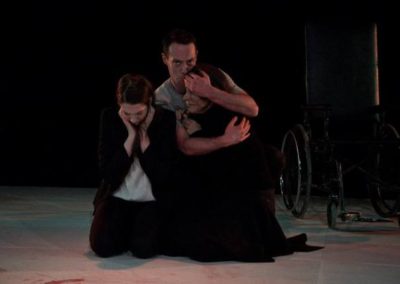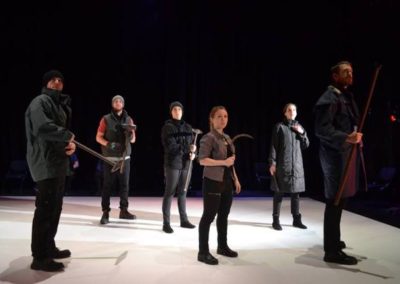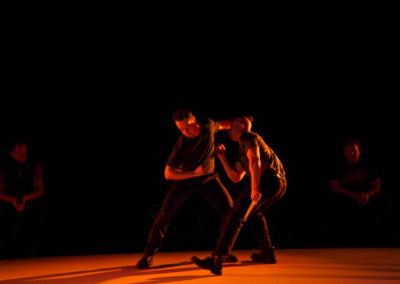The Tragedy of Coriolanus | Burning House
While the growing popularity of the downfall of Coriolanus having some unsettling implications of the current social climate, it allows for a thrilling, complex and terrifyingly contemporary tragedy to finally see the light of day. While the play is infamously divisive, having being used as both fascist and communist propaganda, Robert Johnson’s production sticks closer to the text in exploring both the virtuous and the despicable within all characters in a war between public influence and jealous privacy, tyranny and political game-play.
I saw Tom Heath’s performance in The Merry Wives of Windsor last month, and the range he shows between the youthful Fools and the volatile, hostile Caius Martius is an impressive sight. But it was in the similarities between the two drastically different roles when he was at his most terrifying, with the childlike glee from the comedy becoming disturbing in a man rejoicing in the bloodbath of war rather than in lover’s quarrels. Constantly looking skyward as if for approval of the gods of war, his sense in the absoluteness of power and deserving are also shown crumbling down as his energy and confidence is snuffed out in his banishment, causing a twin sense of uneasy sympathy and terror.
Kerrie-Anne Baker’s Volumnia exudes regal power, offering both comfort and control to her son at the mere touch of a hand and balancing subtle command and rage with a finale of crumbling vulnerability.
A core element in humanising Caius Martius is in his relationships with his family, which here are given careful attention. Kerrie-Anne Baker’s Volumnia exudes regal power, offering both comfort and control to her son at the mere touch of a hand and balancing subtle command and rage with a finale of crumbling vulnerability. Out of the number of line rearrangements and wordless additions, Virgilia’s are most effective, from Charlotte Fox’s scenes encouraging Coriolanus to her despairing mantra praying for his safety against his Volscian enemy. I’ve been wanting interaction between her and Aufidius since I first read the play, and its realisation is more shocking and gut-wrenching than I could have imagined, heightening what was already one of the most devastating takes on Coriolanus’ final reunion with his family. It is also the highest point for Seton Pollock’s take on Coriolanus’ great enemy, mingling the tense, expressive comedy with barely contained rage, and as he restlessly prowls the stage it is impossible to forget the sheer danger both Martius and his family are in.
The set appeared somewhat inspired by the recent Donmar Coriolanus broadcast, and given the play has been so obscure I feel there was greater opportunity for a new visual interpretation. However, the staging itself was extremely effective, with actors remaining in-character silently side stage adding additional layers of complexity to a play engulfed in the conflict between privacy and public life. The contemporary costumes allowed for quick transitions between characters, and as the only actor not to switch roles, Coriolanus’ inflexible, unchanging and independent nature stayed centre-stage. It also allows for a larger crowd of citizens, whose power as a mob was interestingly contrasted with a reluctant and reasonable take on them that seems uncommon for the play. The placement of the tribunes in the opening scene urging them on is fascinating (and historically accurate!), tying their rise to power explicitly with both their influence of the people and their loathing of Coriolanus.
As a current VCE text, I heavily recommend the production to students studying Literature – who knows, you too may become too invested in the play and end up rummaging through op-shops to collect Shakespeare playscripts and working the play into your uni assessments! For those who saw Heartstring’s recent production, it’s a rare chance to see two different takes so close together – for those new to the play, it’s a gripping, rapid-fire interpretation that encourages audiences to form their own opinions within its divisive world.
Click here for The Tragedy of Coriolanus performance dates, ticketing prices and more information.



